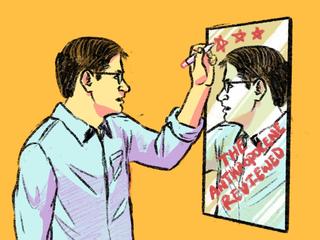Image Courtesy of WNYC Studios.
John Green, the author of several best-selling books such as Turtles All the Way Down, or better known to us college students as the host of the series CrashCourse which saved our world history grades, has also been producing a podcast titled The Anthropocene Reviewed. In his monthly episodes, he shares his epiphanies on the things that have kept humanity, humanity.
In truth, I see this podcast more like a John GreenTM personal journal. He does not contrive himself as an expert in anthropology; instead, he simply reflects on specific moments from his personal life. In the episode “Mortification and Civilization,” John Green explores the evolution of the word “mortification.” To interpret it literally, Green defines “mortification” literally as “to cause death.” “[Nowadays, the word means] extreme fear from public embarrassment… a low-level form of death,” Green said. He then gives us an anecdote from when he was giving a talk in 2008, and one student at the end pointed out to him that his fly was open the entire time. Oops, what a great way to ruin the mood. By sharing his mundane experiences—the Canadian geese in his backyard, the Dr. Pepper he drinks every morning, and a few lyrics from his favorite band, “The Mountain Goats”—Green gives the histories and scientific backgrounds of commonplace objects in his life.
Green extends the conversation from not only everyday occurrences but also problems that impact the world globally and that are deemed “news-worthy.” Green admitted that he would give COVID-19 a one-star rating in the episode “Plague.” “Plague is a one-star phenomenon, but our response needs not to be,” Green said. He reassures us that the COVID-19 pandemic is by no means unprecedented. The Black Death in the 14th century decimated at least one-third of the European population. “Corpses were laid on the streets of Florence… Father did not dare to visit their souls,” Green said. However, in community, there also lies strength. When another round of the pandemic came around again in Eyam in 1665, the village came up with a plan together that held church services outdoors, maintained social distancing, and buried a family’s own dead themselves. Humans had prevailed.
From John Green’s meticulous uncovering of his life’s many intimate moments, he has proven to us that the Anthropocene is an era where happiness, loneliness, life, death, and many other contradicting emotions coexist because we, humans, are on this earth together. This podcast itself is also Green’s way of connecting with his readers in a time where we are forced to be isolated. It is a miraculous feeling to see the famous and knowledgeable author, whom I look up to, talk to his listeners as a part of the ordinary ether. And in this age of quarantining, at least I, John Green, and other listeners of this podcast, are here together.
Indeed, I would give The Anthropocene Reviewed a rating of five out of five stars.

